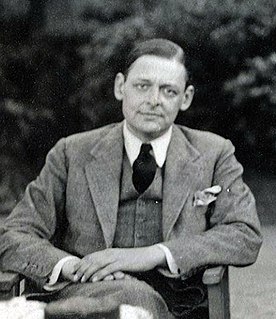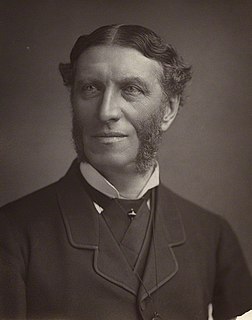
Thomas Stearns Eliot, "one of the twentieth century's major poets", was also an essayist, publisher, playwright, and literary and social critic. Born in St. Louis, Missouri to a prominent Boston Brahmin family, he moved to England in 1914 at the age of 25 and would settle, work and marry there. He became a British subject in 1927 at the age of 39, subsequently renouncing his American passport.

Alfred Tennyson, 1st Baron Tennyson was a British poet. He was the Poet Laureate of Great Britain and Ireland during much of Queen Victoria's reign and remains one of the most popular British poets. In 1829, Tennyson was awarded the Chancellor's Gold Medal at Cambridge for one of his first pieces, "Timbuktu." He published his first solo collection of poems, Poems Chiefly Lyrical in 1830. "Claribel" and "Mariana", which remain some of Tennyson's most celebrated poems, were included in this volume. Although decried by some critics as overly sentimental, his verse soon proved popular and brought Tennyson to the attention of well-known writers of the day, including Samuel Taylor Coleridge. Tennyson's early poetry, with its medievalism and powerful visual imagery, was a major influence on the Pre-Raphaelite Brotherhood.

Matthew Arnold was an English poet and cultural critic who worked as an inspector of schools. He was the son of Thomas Arnold, the famed headmaster of Rugby School, and brother to both Tom Arnold, literary professor, and William Delafield Arnold, novelist and colonial administrator. Matthew Arnold has been characterised as a sage writer, a type of writer who chastises and instructs the reader on contemporary social issues.

Jorge Agustín Nicolás Ruiz de Santayana y Borrás, known in English as George Santayana, was a philosopher, essayist, poet, and novelist. Originally from Spain, Santayana was raised and educated in the United States from the age of eight and identified himself as an American, although he always retained a valid Spanish passport. He wrote in English and is generally considered an American man of letters. At the age of forty-eight, Santayana left his position at Harvard and returned to Europe permanently, never to return to the United States.
Alexander Balloch Grosart was a Scottish clergyman and literary editor. He is chiefly remembered for reprinting much rare Elizabethan literature, a work which he undertook because of his interest in Puritan theology.
This article presents lists of the literary events and publications in 1884.

Charles Eliot Norton was an American author, social critic, and professor of art. He was a progressive social reformer and a liberal activist whom many of his contemporaries considered the most cultivated man in the United States.

Frederick Locker-Lampson (1821–1895) was an English man of letters, bibliophile and poet.

Gary James Paulsen is an American writer of young adult literature, best known for coming of age stories about the wilderness. He is the author of more than 200 books and has written more than 200 magazine articles and short stories, and several plays, all primarily for teenagers. He won the Margaret Edwards Award from the American Library Association in 1997 for his lifetime contribution in writing for teens.

Joseph Leon Edel was a North American literary critic and biographer. He was the elder brother of North American philosopher Abraham Edel.
Ann Thwaite is a British writer who is the author of five major biographies. AA Milne: His Life was the Whitbread Biography of the Year, 1990. Edmund Gosse: A Literary Landscape was described by John Carey as "magnificent - one of the finest literary biographies of our time". Glimpses of the Wonderful about the life of Edmund's father, Philip Henry Gosse, was picked out by DJ Taylor in the Independent as one of the "Ten Best Biographies" ever. Frances Hodgson Burnett was originally published (1974) as Waiting for the Party and reissued in 2007 with the sub-title Beyond the Secret Garden. Emily Tennyson, The Poet's Wife (1996) was reissued by Faber Finds for the Tennyson bicentenary in 2009.
Partial Portraits is a book of literary criticism by Henry James published in 1888. The book collected essays that James had written over the preceding decade, mostly on English and American writers. But the book also offered treatments of Alphonse Daudet, Guy de Maupassant and Ivan Turgenev. Perhaps the most important essay was The Art of Fiction, James' plea for the widest possible freedom in content and technique in narrative fiction.

Notes on Novelists is a book of literary criticism by Henry James published in 1914. The book collected essays that James had written over the preceding two decades on French, Italian, English and American writers. The book also contained a controversial essay, The New Novel, 1914, which passed judgment on various contemporary writers and occasioned much disagreement.

A Small Boy and Others is a book of autobiography by Henry James published in 1913. The book covers James' earliest years and discusses his intellectually active family, his intermittent schooling, and his first trips to Europe.

"The Middle Years" is a short story by Henry James, first published in Scribner's Magazine in 1893. It may be the most affecting and profound of James's stories about writers. The novelist in the tale speculates that he has spent his whole life learning how to write, so a second life would make sense, "to apply the lesson." Second lives aren't usually available, so the novelist says of himself and his fellow artists: "We work in the dark—we do what we can—we give what we have. Our doubt is our passion and our passion is our task. The rest is the madness of art."
— From Cantos 27 and 56, In Memoriam A.H.H., by Alfred Tennyson, published this year
Traditionalist conservatism, also known as classical conservatism,traditional conservatism, and infrequently Toryism is a political philosophy or ideology emphasizing the need for the principles of a transcendent moral order, manifested through certain natural laws to which society ought to conform in a prudent manner. Shortened to traditionalism and in the United Kingdom and Canada referred to as Toryism, traditionalist conservatism is a variant of conservatism based on the political philosophies of Aristotle and Edmund Burke. Traditionalists emphasize the bonds of social order and the defense of ancestral institutions over what it considers excessive individualism.

Edmund Henry Garrett (1853–1929) was an American illustrator, bookplate-maker, and author—as well as a highly respected painter—renowned for his illustrations of the legends of King Arthur.


















